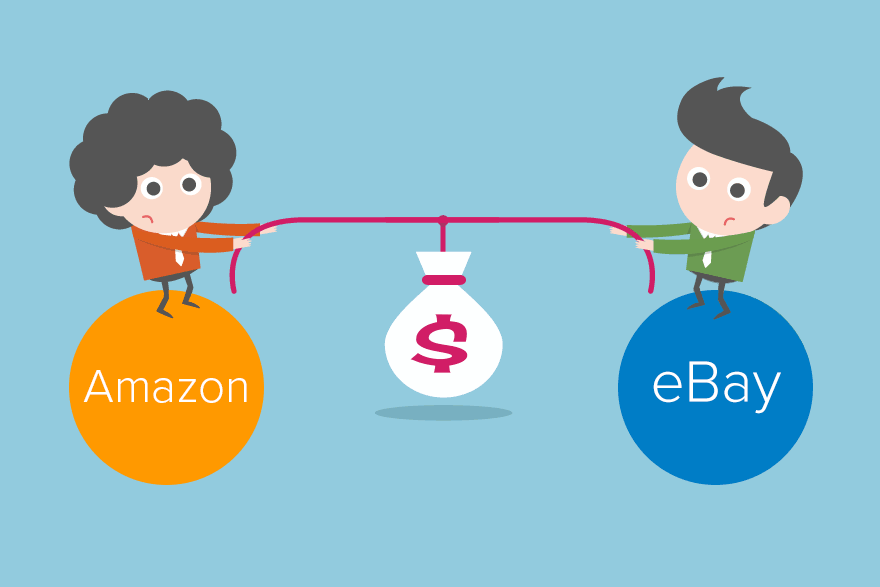Selling your products on eBay and Amazon can be a great way to get visibility for your brand and generate sales. However, depending on the type of products you’re selling, certain selling strategies may be more beneficial than others. This article will look at the pros and cons of selling on both platforms so that you can make an informed decision about which one is right for your business. (Buying and Selling On Amazon Vs. Ebay).
Selling On Amazon
Amazon is one of the biggest names in retail and has a massive customer base to sell to. It’s one of the most beneficial places to sell if you have a product that fits the following criteria:
- You have an Amazon-friendly product.
- You have a brand that aligns with the Amazon brand and culture.
- You have a high-quality product.
- Your listing is optimized for Amazon.
Amazon’s massive network and ease of use means it’s often a great choice for new ecommerce entrepreneurs looking to test the waters and build their customer base. It’s also a great way to go above and beyond your competitors’ offerings and stand out from the crowd.
However, there are a couple of downsides to selling on Amazon that you should keep in mind before committing to a strategy. Firstly, Amazon is known for its FBA program. This stands for “fulfillment-by-Amazon” and allows retailers to store their inventory in Amazon’s warehouses.
This means the customer doesn’t get to physically see your product, meaning there’s less customer satisfaction and loyalty. However, if customer satisfaction is at the heart of your business, this may not be as big of a deal for you as it is for other businesses.
Buying On Amazon
Amazon’s vast customer base and ease of use are great for selling to customers once they’ve made the decision to purchase from you. However, the vast majority of sales on Amazon are made through third-party sellers who aren’t directly affiliated with the brand.
This means that unless your product aligns incredibly well with Amazon’s brand, your sales may be diluted by the massive number of other brands selling on the platform. Amazon’s selling ecosystem also means that the most common sales channels are also the most popular. This means that you’re almost guaranteed to be competing with the majority of your competition by selling on Amazon.
Buying From eBay
eBay is a popular place for selling second-hand goods and is often the go-to destination for sellers looking to offload inventory. Because the items are already listed on the market, they’re usually cheaper than new goods, which can be a huge draw for sellers.
The advantage of selling on eBay is that your inventory is available for potential customers to view, meaning there’s a more personal connection with the purchase. While the items are listed on eBay, they’re not listed on Amazon, meaning you’re less likely to cannibalize sales from your own listings on Amazon. (Buying and Selling On Amazon Vs. Ebay).
However, most sellers on eBay operate on a “buy-it-now” basis. This means that even if you have a buyer, you still have to ship the items to them. This can mean a lot of extra costs and time that you may not have to deal with if you sell on Amazon.
Selling On eBay
Selling items on eBay can be a great way to clear out your inventory and generate some cash. Because the items are already listed, they’re usually cheaper than new goods, which can be a huge draw for sellers. The advantage of selling on eBay is that your inventory is available for potential customers to view, meaning there’s a more personal connection with the purchase.
The items are listed on eBay, but they’re not listed on Amazon, meaning you’re less likely to cannibalize sales from your own listings on Amazon. However, most sellers on eBay operate on a “buy-it-now” basis. This means that even if you have a buyer, you still have to ship the items to them. This can mean a lot of extra costs and time that you may not have to deal with if you sell on Amazon.
Summing up
Amazon and eBay are great platforms for both buyers and sellers. Amazon is an excellent choice for selling products that fit the product categories they support, while eBay is great for selling off-brand items. However, in terms of which to sell on, you may want to consider the pros and cons of selling on each platform. Keep in mind that both platforms are growing, so it can be beneficial to keep an eye out for new opportunities on either.
